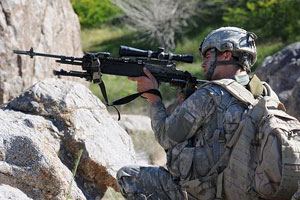Some words have a way of enduring. Take “endure.” As the Bush administration headed into Iraq in the spring of 2003, the Pentagon already had plans on the drawing board to build at least four gigantic American bases in that country and garrison them for the long haul. But when questioned on the subject, administration officials and spokespeople were eager to avoid linking the word “permanent” to those as-yet-unbuilt bases and so, for a while, referred to them instead as “enduring camps,” a phrase that had a certain charm and none of the ominous overtones of “permanent base.” In the end, of course, more than four massive bases were built and garrisoned. Given the slow American drawdown in that country, their fate remains unknown—and typically undiscussed in the US—but as of this moment, they still “endure” and, huge as they are, they couldn’t look more permanent.
According to an agreement signed at the end of George W. Bush’s second term, all American “combat troops” are to be withdrawn from Iraq by this August, hence the US military is planning to relabel any post-August “combat operations” as “stability operations.” Think of that as linguistic “endurance.” In the same spirit, all US troops are supposed to be out of Iraq by the end of 2011, but as Tim Arango of the New York Times noted recently, “[F]ew believe that America’s military involvement in Iraq will end then. The conventional wisdom among military officers, diplomats, and Iraqi officials is that after a new government is formed, talks will begin about a longer-term American troop presence. ‘I like to say that in Iraq, the only thing Americans know for certain, is that we know nothing for certain,’ said Brett H. McGurk, a former National Security Council official in Iraq and current fellow at the Council on Foreign Relations. ‘The exception is what’s coming once there’s a new government: they will ask to amend the Security Agreement and extend the 2011 date. We should take that request seriously.'”
There is, in other words, a well-based possibility—or at least serious American dreaming—that our mega-installations in Iraq (including our nearly three-quarters-of-a-billion-dollar citadel of an embassy in the heart of Baghdad that takes more than $1.5 billion a year to run and has 1,800 private security guards) will endure.
Now, hop a couple of thousand miles to another war, Afghanistan, and a newly appointed war commander testifying before the Senate in his confirmation hearings. Responding to questions about President Obama’s previously announced decision to begin some kind of an American drawdown there in July 2011, General David Petraeus spent much time playing down the significance of that date (as did the president). He even brought up the possibility that the date could be delayed. In the process, choosing his words with care, he said this: “It is important to note the President’s reminder in recent days that July 2011 will mark the beginning of a process, not the date when the US heads for the exits and turns out the lights. As he explained this past Sunday, in fact, ‘we’ll need to provide assistance to Afghanistan for a long time to come…’ Moreover, as President Karzai has recognized, and as a number of allied leaders noted at the recent G-20 Summit, it is going to be a number of years before Afghan forces can truly handle the security tasks in Afghanistan on their own. The commitment to Afghanistan is necessarily, therefore, an enduring one, and neither the Taliban nor our Afghan and Pakistani partners should doubt that.” Given the history of America’s recent wars, that “enduring” couldn’t represent a more ominous choice of words.
Retired Lieutenant Colonel and TomDispatch regular William Astore takes a look at the single most “enduring” aspect of the American military scene in our time, our persistent war-making—and the war preparations that go with it.










